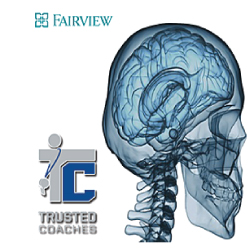
What is a concussion?
A concussion is a mild traumatic brain injury (TBI) that occurs from a direct blow or bump to the head. It can also result from a blow to another part of the body when the force travels to the head. A concussion can affect coordination, learning, memory, and emotions.
Most concussions heal without issue. However, like any other injury, a brain injury should be given time to heal, which includes physical and mental rest.
One of the most severe problems that can occur is bleeding inside the brain. If bleeding or swelling occurs, pressure in the skull rises and can cause brain injury. Bleeding might develop right after an injury or hours later, so monitoring symptoms is critical as this can be life threatening.
Signs and Symptoms
Common symptoms include:
• Altered mental status including confusion, inappropriate emotions, agitation or abrupt change in personality
• Amnesia/memory problems
• Blurred vision/double vision/seeing stars or black spots
• Dizziness, poor balance or unsteadiness
• Excessive fatigue/feel slowed down
• Excessive or persistent headache
• Excessive sensitivity to light or loud noise
• Feel “in a fog”
• Loss of consciousness or orientation
• Ringing in ears
• Vacant stare/glassy eyed
• Vomiting
Why do a baseline computer test?
Neurocognitive tests, such as ImPACT®, provide information on how the brain is responding to injury. ImPACT has two components: a pre- and post-concussion test. The pre-test scoring represents one’s baseline (normal) brain function. The ImPACT test is then repeated post injury. Results of the pre- and post-concussion tests are compared and a care plan is developed. An ImPACT test should be completed yearly due to natural maturing of the brain.
What can I expect from Fairview’s concussion program?
Fairview Sports and Orthopedic Care (FSOC) providers will:
• Facilitate ImPACT tests
• Manage concussion symptoms and make recommendations for return to activity
• Facilitate post-concussion testing
• Our team includes other healthcare providers, including neuropsychologists, neurologists and therapists who specialize in concussion management and will provide you with comprehensive, coordinated care
When is it safe to return to activity?
You should be free of symptoms and have returned to normal sleeping and eating patterns as well as typical concentration levels before resuming activity. Once normal activities have resumed and there are no symptoms at rest, more demanding activities may be tried. Over time, activity will be increased as long as symptoms do not return. A gradual return to activities allows us the opportunity to assess brain healing.
Under no circumstances should anyone return to activity while experiencing concussion signs or symptoms. There should be no return to activity on the same day concussion symptoms are noted or a formal diagnosis of a concussion is made.
For more information contact:
Sports concussion hotline: 952-460-4440
Schedule an appointment: 612-672-7100
Fairview is a proud supporter of MYAS and its affiliate, Trusted Coaches. Trusted Coaches focuses on not only concussion safety for todays youth, but is also a comprehensive membership program that offers essential training, education and screening necessary for a youth coach via a nationwide criminal background check‚ first-aid training, concussion instruction and Positive Coaching Alliance Double-Goal Coach® character education course.
